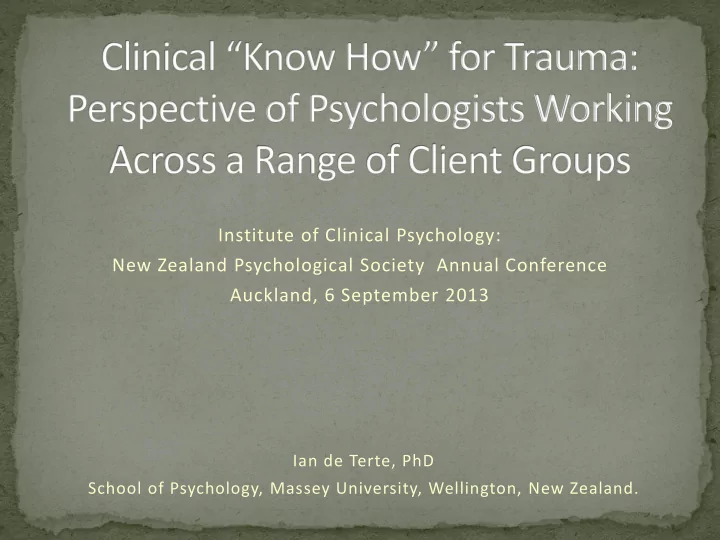

Institute of Clinical Psychology: New Zealand Psychological Society Annual Conference Auckland, 6 September 2013 Ian de Terte, PhD School of Psychology, Massey University, Wellington, New Zealand.
Introduction Trust Occupational PTSD Alliance/Engagement Case Study Questions 2
“one’s willingness to be vulnerable to another group member’s actions based on a sense of confidence in the group member’s competence” (Sweeney, 2010, p. S71). Three precursors to develop trust in another person: Competence Confidence Willingness to be place in a position of vulnerability 3
Personnel who trust others tend to have a positive attitude towards change How can therapists improve client’s trust? Suggestions? 4
Reexperiencing Avoidance Hyperarousal Castro, C. A., & Adler, A. B. (2011). Reconceptualizing combat-related posttraumatic stress disorder as an occupational hazard. In A. B. Adler, P. D. Bliese, & C. A. Castro (Eds.), Deployment psychology: Evidence-based strategies to promote mental health in the military (pp. 217–242). Washington, DC: APA. . 5
Therapist training Clinical supervision Therapist effects 6
The amount and type of training remains unclear, but the importance of training is unquestioned. Types of training include: Participating in workshops Reviewing written materials Watching master clinicians 7
Helping therapists reduce avoidance during therapy Language used by therapists in supervision Therapist’s flexible interpersonal style 8
Also has been referred to as therapeutic alliance How to build this alliance? Genuineness The use of humour Ability of therapists to listen to the client. Therapists ability to handle interpersonally challenging behaviours. 9
10
Laska, K. M., Smith, T. L., Wislocki, A. P., Minami, T., & Wampold, B. E. (2013). Uniformity of evidence-based treatments in practice? Therapist effects in the delivery of cognitive processing therapy for PTSD. Journal of Counseling Psychology , 60, 31–41. doi:10.1037/a0031294 Sweeney, P. J. (2010). Do soldiers reevaluate trust in their leaders prior to combat operations? Military Psychology , 22 (Suppl 1), S70–S88. doi:10.1080/08995601003644312 Campbell, D. J., & Campbell, K. M. (2009). Embracing Change: Further Examination of a “ Capabilities and Benevolence ” Beliefs Model in a Military Sample, Military Psychology, 21, 351–364. doi:10.1080/08995600802565701 11
E-Mail: i.deterte@massey.ac.nz Website: about.me/deterte 12
MASSEY UNIVERSITY MASSEY RESEARCH ONLINE http://mro.massey.ac.nz/ Massey Documents by Type Oral Presentations Institute of Clinical Psychology - Case Study Forum: Defence Trauma de Terte, ID 2013 11/05/2020 - Downloaded from MASSEY RESEARCH ONLINE
Recommend
More recommend